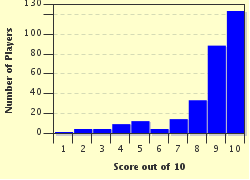Quiz Answer Key and Fun Facts
1. To begin with, what does the name Habakkuk (Chabaqquq) most nearly mean?
2. Habakkuk offers a complaint to God: He is ignoring Habakkuk's cries for help for the nation of Judah as it suffers through its "death throes." He then goes on to say that evil and wickedness are taking the place of righteousness. When God responds to him in Habakkuk 1:5, what does He tell Habakkuk about what He is doing?
3. How are the Chaldeans described in Habakkuk 1:6, in the King James Version?
4. Habakkuk questions the Lord in chapter 1, verse 13, and in so doing he comments upon God's eyes, according to the King James Version of the Bible. How does he describe the eyes of God?
5. According to Habakkuk 2:1, what does Habakkuk say that he himself will do in response to the outrages that will be visited on his nation as it suffers at the hand of the Chaldeans, in the King James Version?
6. According to Habakkuk 2:4, in the King James Version of the Bible, when God answers Habakkuk, what does He say that the "just" person would live by?
(That is, the person who is fair in his judgments, as well as one who is justified in God's eyes.)
7. In Habakkuk 2:5-10, what does God have to say about the evil and wicked people that Habakkuk has complained about previously?
8. The last verse of the second chapter end with these words: "...let all the earth keep silence before him." (The 'him' in this quotation refers to God.) What is the statement immediately preceding it?
9. In Habakkuk's prayer to God in the third chapter, what does he ask God to do as the nation undergoes its painful demise because of God's wrath?
10. How does Habakkuk finalize his prayer at the end of his prophecy?
Source: Author
logcrawler
This quiz was reviewed by FunTrivia editor
CellarDoor before going online.
Any errors found in FunTrivia content are routinely corrected through our feedback system.

